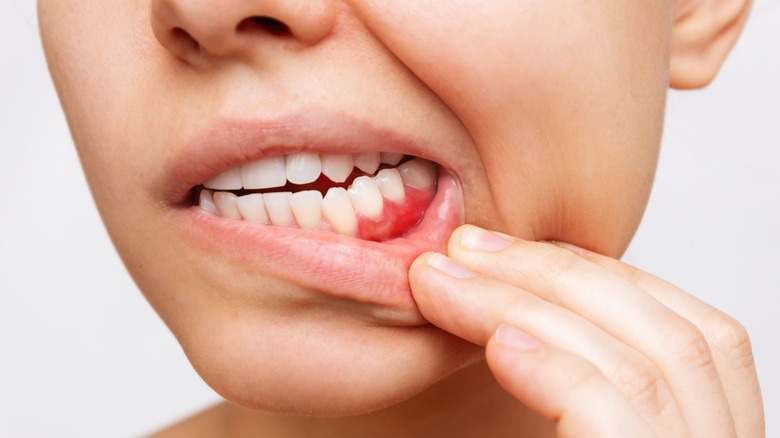What Does It Mean When You Have Swollen Gums Around One Tooth?
When it comes to dental care, the focus tends to be on the teeth themselves, and the prevention of cavities therein (via WebMD). However, your gums shouldn't be overlooked. According to the Centers for Disease Control and Prevention (CDC), nearly half of Americans over 30 have some form of gum disease, and more than 70% of adults over 65 are affected by it.
It can be shocking to be looking in the mirror — or to even be feeling your teeth with your tongue — and notice that your gums are swollen around one tooth. This swelling, caused by a flow of white blood cells to the gum tissue, can make it difficult to eat or talk (via Cherrywood Dental Care). When the swelling is localized to one tooth, it's a sign that something is happening there and your body is working to heal. There can be a number of things at work inside your gums that could be causing that kind of localized swelling, from an abscessed tooth, gum disease, or even a problem with your jaw bone. If left untreated, it could lead to something more serious.
Proper dental care will save you trouble
One of the most common triggers of swollen gums is poor dental hygiene (via Healthline). Improper brushing leads to food debris being left behind, which can cause inflammation, as well as bad breath, bleeding gums, and the loosening of the tooth. Poor dental hygiene can also lead to a buildup of plaque and tartar, caused by the bacteria in our mouths not being properly brushed away. This tartar buildup can lead to gingivitis, a gum disease characterized by redness and swelling, or a more serious condition known as periodontitis.
Medical News Today notes that swelling gums around a tooth could also be the result of an abscess, caused by a bacterial infection that allows pus to collect in both the tooth and the surrounding gum tissue. Abscesses should be treated by your dentist promptly. According to a 2022 report published in StatPearls, untreated dental abscesses carry a 40% mortality rate.
In order to keep your gums healthy, WebMD recommends that you brush your teeth at least twice a day, while also flossing regularly and rinsing with mouthwash. You should also eat a diet that is rich in calcium and vitamin C, and avoid tobacco products. According to Medical News Today, you should see your dentist if you have sores that last longer than a week, difficulty chewing or swallowing, or an uneven bite. In addition, you should be making regular dental appointments — regardless — to ensure that any issues are caught early.


